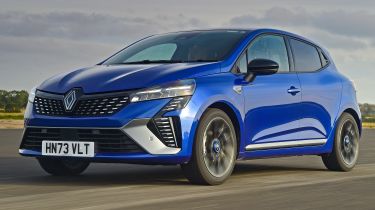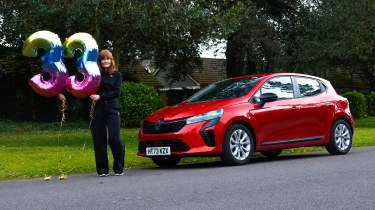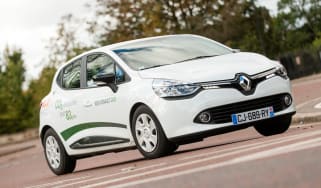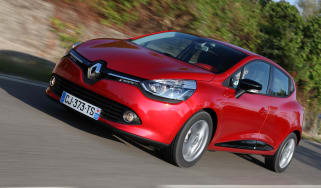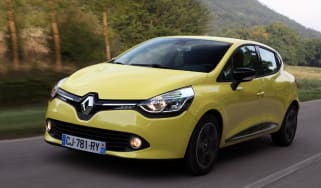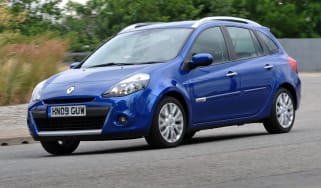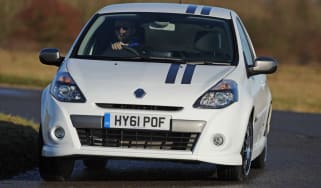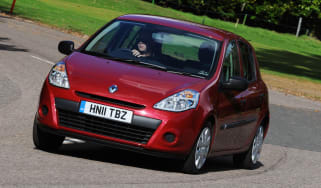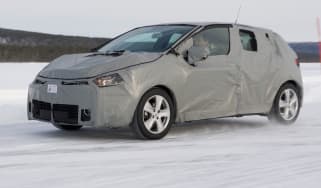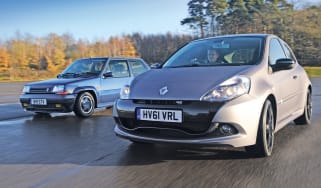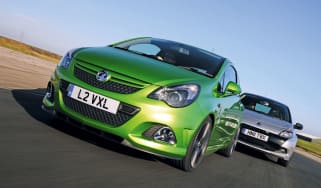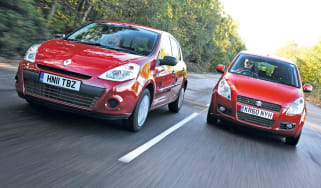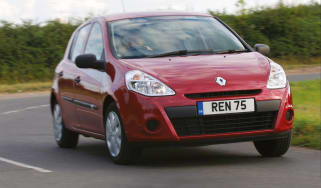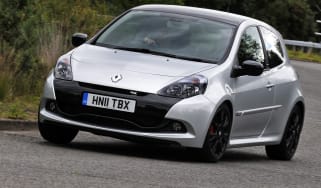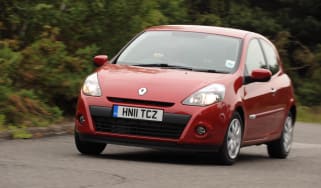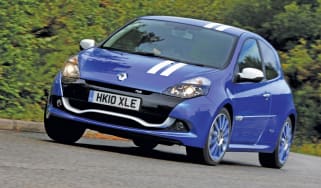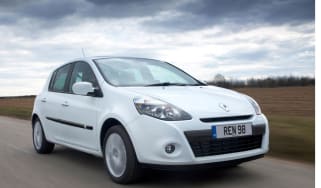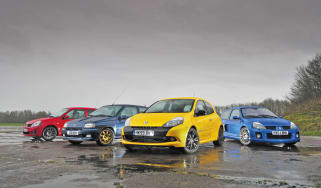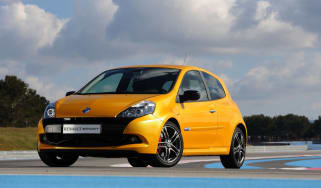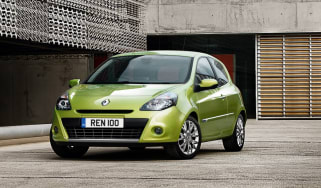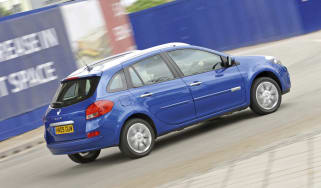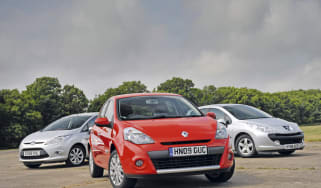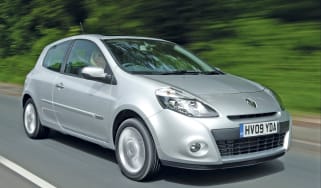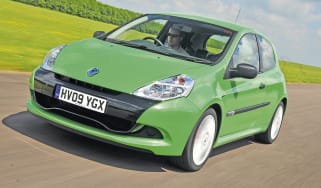Renault Clio review
The Renault Clio is a star of the supermini class – stylish, well-built, good to drive and packed with tech

The Renault Clio refuses to relinquish its position as one of the best superminis on the market. A high-quality and well-equipped item despite its competitive pricing, the Clio feels as refined as much larger hatchbacks and handles well, too. The facelifted French supermini also has a new, much more striking look that’s transformed the already handsome Clio into a serious head-turner.
The interior admittedly lacks the wow-factor you get from Renault’s newer models and their Google tech, but the Clio’s cabin still feels polished and prioritises ergonomics over design, which is no bad thing. The full-hybrid Clio E-Tech offers impressive fuel economy and zippy EV-like performance around town, however a pure-petrol version remains available, with an attractive starting price and class-leading boot space. Either way, if you're after a capable supermini, the Renault Clio deserves your full attention.
About the Renault Clio
The Renault Clio is one of the most recognisable names in the automotive world – at least in Europe anyway. It’s one synonymous with small, reasonably priced superminis that are great to drive and offer lots of big-car appeal. More than 16 million Clios have been sold since the first one arrived in 1990, with the current, fifth-generation model continuing its legacy and managing to win our Supermini of the Year award in 2020, 2021 and 2022.
Used - available now
The latest Clio was launched back in 2019, when it was pitched squarely against the ever-popular Ford Fiesta. Of course, since then the Blue Oval’s beloved supermini has kicked the bucket, while its French nemesis was given a new lease of life thanks to a dramatic facelift.
The Clio’s striking new look borrows heavily from Renault’s mid-size SUV, the Renault Austral, as well as its all-electric Renault Megane E-Tech hatchback. The visual changes include the ‘F1 Blade’ in the front bumper and vertical daytime-running lights. Renault’s redesigned logo also sits proudly in the heart of the grille, while the rear has been given a new set of tail lights, plus aerodynamic elements in the bumper to emphasise the car’s width.
Like before, there are two engine options available: the entry-level pure-petrol TCe 90 pairs a 89bhp three-cylinder motor with a six-speed manual gearbox – the same combo offered in the Clio’s distant cousin, the Dacia Sandero. Alternatively, the full-hybrid Clio E-Tech features a 1.6-litre four-cylinder petrol engine and two electric motors powered by a 1.2kWh battery. This not only offers improved fuel economy, but also to run in EV mode for short distances or up to 80 per cent of the time when driving in town, according to Renault.
The Clio’s trim structure also got tweaked as part of the mid-life facelift, so it now includes Evolution and Techno specifications – the same as before – but Esprit Alpine trim level now sits above them and replaces the old R.S. Line and E-Tech Engineered options.
Prices start from just under £18,000 for the petrol Clio, or £21,500 for the Clio E-Tech. All Clios come as standard with alloy wheels, LED headlights, wireless Apple CarPlay and Android Auto, two seven-inch displays, plus a suite of active safety systems, including lane-keep assist and lane departure warning. Work your way up through the price list, and you’ll be rewarded with larger wheels, a rear-view camera, a 9.3-inch central touchscreen and a 10-inch digital driver’s display.
The Clio is clearly one of the best supermini options based on the silverware it has gained from us, which is impressive given the plethora of talented rivals the Clio has. The Honda Jazz and Toyota Yaris both utilise efficient hybrid technology just like the Clio, while the Peugeot 208 and Vauxhall Corsa have a wide range of petrol, mild-hybrid, and all-electric power in the form of the Peugeot E-208 and Vauxhall Corsa Electric.
We’d say the Peugeot is almost as fun to drive and perhaps has the edge for desirability over the Renault, but it can’t quite match the Clio for practicality. The Skoda Fabia and Volkswagen Polo feel well-finished and refined, and the MINI Cooper combines retro looks with a sophisticated cabin.
Engines, performance and drive
Overall, the Renault Clio feels like a quality product on the road: polished, comfortable, and, at higher speeds, as refined as some hatchbacks from the class above. But the Clio has also garnered a reputation for driving thrills over the years, and it remains one of the better-handling superminis on the market.
The steering is well-weighted and direct, and there’s just a hint of body roll as you chuck the Clio into corners. It also manages to remain composed even on bumpy back roads, thanks to the Clio’s forgiving ride. The heavily bolstered sports seats in top-spec esprit Alpine models also stop you from sloshing around the cabin when changing direction quickly, although wider individuals may find them a little snug.
The high-mounted six-speed manual gear lever in the pure-petrol model works well ergonomically but doesn’t have the most engaging gear change action. Changing gear is a more pleasurable experience in a SEAT Ibiza or Volkswagen Polo, but there’s nothing especially terrible about the Clio’s manual ‘box.
The Clio’s hybrid powertrain, meanwhile, always starts off running in electric mode, so you simply zip away from a standstill. You have to be incredibly delicate with the throttle if you don’t want to wake the E-Tech’s petrol engine, otherwise it’ll wake from its slumber once you go beyond 20mph. The transition is smooth enough in the default ‘My Sense’ drive mode, but if you switch to ‘Sport’ then the step-change is more noticeable.
0-62mph acceleration and top speed
The regular Clio is powered by a turbocharged 1.0-litre three-cylinder petrol engine that produces 89bhp and 160Nm of torque, gets from 0-62mph in a rather lethargic 12.2 seconds, and goes on to a top speed of 112mph. Power is sent to the front wheels through a six-speed manual gearbox.
Meanwhile, the Clio E-Tech uses a 1.6-litre four-cylinder engine and two electric motors, which produce a total of 143bhp, with up to 205Nm of torque at your disposal when you’re running on the electric motor. Renault says the hybrid Clio will sprint from 0-62mph in 9.3 seconds, which sounds decent, but the gearbox can become a little flustered deciding which gear to select and when to change up or kick down. Top speed for the Clio E-Tech also stands at 112mph.
The E-Tech hybrid system is a little different to what you’ll find in a Toyota Yaris. While the Clio has two electric motors, only one helps to drive the wheels, with the second smaller motor used to fire up the engine and make gear shift feel smoother. Power delivery is linear during hard acceleration, but once again, the transmission takes its sweet time deciding when it’s going to change gear and there are no paddles on the steering wheel, or any other way to force it to shift up.
MPG, CO2 and running costs
While the facelifted Renault Clio was offered exclusively with a full-hybrid powertrain initially, a pure-petrol engine option has since returned to the line-up. Some rival superminis like the Honda Jazz and Toyota Yaris are now hybrid-only, but in a statement to Auto Express, Renault said that the pure-petrol Clio has returned “in order to meet the needs of some customers in a difficult economic climate."
The entry-level Clio TCe 90 starts from just under £18,000 and uses Renault’s familiar turbocharged 1.0-litre three-cylinder petrol engine that it shares with its distant cousin, the Dacia Sandero. In the Clio, the three-pot motor comes paired with a six-speed manual gearbox, emits between 118 to 120g/km of CO2 and can average up to 54.3mpg on the WLTP combined cycle.
The full-hybrid Clio E-Tech is now cheaper than it was pre-facelift, but it still costs £3,500 more than the equivalent pure-petrol model. In return, you get the ability to drive around on electric power, plus improved fuel economy and reduced CO2 emissions.
Renault claims the Clio E-Tech will return up to 67.3mpg and emits 96-97g/km of CO2. We couldn’t match that figure when we tested the hybrid supermini on UK roads, although we did manage to average 55.2mpg on a journey that included towns, motorways and a couple of spirited blasts on back roads.
As this is just a full-hybrid, not a plug-in hybrid, the Clio E-Tech doesn’t have an official electric driving range. Its 1.2kWh battery allows for low-speed electric-only running, but Renault maintains you could spend 80 per cent of your time driving on battery power when in town.
The E-Tech hybrid will cost slightly less to tax per year compared with the regular petrol version because it is classed as an alternative fuel vehicle, and all versions of Clio are well below the £40k road tax surcharge limit, so there won't be an additional fee to pay.
Company car drivers paying Benefit-in-Kind (BiK) payments will be better off with the E-Tech hybrid because it falls into the 24 per cent band (the same as a Toyota Yaris), whereas the regular petrol will be in either the 28 or 29 per cent band, depending upon the trim level you go for. Anyone aiming to pay less in tax will need to look for something all-electric, like the BYD Dolphin, MG4, Peugeot E-208, or Vauxhall Corsa Electric.
Insurance groups
The facelifted Renault Clio sits in insurance groups 10-15 (out of 50), depending on the engine and trim level you go with. For context, the Skoda Fabia lands in groups 4-20, while the Honda Jazz starts from group 19.
Depreciation
Our experts predict that the new Renault Clio range will retain between 50 and 53 per cent of its value after three years and 36,000 miles. The Suzuki Swift sits right in the middle at 52 per cent, while the Skoda Fabia is projected to retain 46-54 per cent.
To get an accurate valuation on a specific model check out our free car valuation tool...
Interior, design and technology
For the Mk5 Clio’s mid-life facelift, Renault decided to ditch the smooth, subtle front end it originally had for a much sharper and certainly more distinctive look that takes its inspiration from Renault’s new Austral family SUV, Rafale coupe-SUV and all-electric Megane E-Tech hatchback.
The updated Clio’s LED headlights are slimmer than before and are flanked by a new and very dramatic lighting signature. The rear end has also received a bit of a nip and tuck, with new tail-lights and aerodynamic elements in the rear bumper to emphasise the car’s width. There’s also fresh colour options and new wheel designs stretching up to 17 inches, including the rather fetching diamond-cut rims on the new range-topping Esprit Alpine trim.
Compared to its predecessor, the Mk5 Clio made some big steps forward in terms of build quality, materials used and, perhaps most importantly in today’s market, infotainment. It was already one of the best interiors in the supermini class, so we’re not surprised Renault didn’t change much as part of the car’s facelift. That said, a few more tweaks wouldn’t have gone amiss, as the Clio’s cabin lacks the wow-factor you get from the Austral or Megane, and the Google tech featured in both.
On the plus side, the Clio’s dashboard continues to prioritise ergonomics over style, as it still uses physical dials and piano-style keys, plus all the major controls are raised so they’re easy to reach when you’re driving. A touchscreen infotainment display – available in two sizes – sits proudly in the centre, canted towards the driver, and is also easily reached and operated.
There’s a lot of plastic on show, but the majority of it feels of good quality and it’s all well put-together. Plus, you won’t find any cowhide inside the Clio now, with certain models instead using either bio-sourced or partially recycled materials.
Iconic and SE Edition trims have been discontinued, with Evolution and Techno specifications taking their place in the Clio line-up behind the new Esprit Alpine trim which essentially replaces R.S. Line, while E-Tech Engineered has also been axed.
Entry-level cars are well-equipped, with 16-inch alloy wheels, LED headlights, lane keeping assist and rear parking sensors all included as standard. Inside you’ll find a seven-inch digital driver’s display and central touchscreen of the same size.
Upgrading to a Techno version brings bigger 17-inch alloys, body-coloured ‘F1 Blade’, honeycomb lower grille, chrome exterior trim, a rear-view camera, ‘biobased’ upholstery and a wireless smartphone charging pad. Techno models also add three driving modes and an electric parking brake with auto-hold function for stop-start traffic.
Esprit Alpine trim builds on previous specifications by adding a contrasting coloured ‘F1 Blade’, 17-inch diamond-cut wheels, Alpine-branded sports seats, aluminium pedals, a perforated steering wheel and French tricolour details dotted around the cabin. Top-spec cars also feature adaptive cruise control, blind spot warning, a 9.3-inch central touchscreen and a 10-inch digital driver’s display.
Sat-nav, stereo and infotainment
Every Renault Clio comes with wireless Android Auto and Apple CarPlay connectivity, sat-nav, a digital driver’s display and central touchscreen. But as we mentioned, lower-spec cars get two seven-inch displays, meanwhile, top-of-the-range models feature a 10-inch instrument panel and 9.3-inch touchscreen.
The Clio doesn’t benefit from Renault’s magnificent Google-powered OpenR Link infotainment software, like you’ll find in the Megane E-Tech and Austral. Instead, it sticks with Renault’s older ‘easylink’ setup that’s still easy enough to navigate, and the home page – split into three main functions – is reminiscent of the systems fitted to more premium offerings. But the Clio’s system can be quite sluggish at times, and simply isn’t as intuitive as the firm’s latest software.
The lack of a physical volume knob means that it’s not immediately obvious how to adjust audio settings on the move compared with other superminis, but the Clio does feature extra controls mounted behind the wheel on the steering column. They’re largely unchanged from Renaults built as far back as 20 years ago, and with good reason – the setup is very simple and easy-to-use.
Practicality, comfort and boot space
The latest Renault Clio’s revised underpinnings have allowed for some improvements in cabin space over its predecessor. All models are five-door only but retain a sportier three-door look thanks to expertly disguised rear door handles tucked into the C-pillars.
It’s easy to get comfortable up front in the Clio. There’s a wide range of adjustment, especially in the steering column, and the seats themselves are comfortable. Ergonomics are a strong point for the Clio, too, as the gear lever and other important controls are all easily reachable, plus the climate controls are just three simple, physical knobs below the touchscreen. Even the touchscreen is close enough that you don’t need to stretch to access its menus.
Visibility is good for the most part so the view out is great, but the rear window is a little small if we’re being picky. The Clio’s spacious doorbins and the enclosed storage between the front seats help redeem it.
Dimensions and size
The Renault Clio measures in at 4,053mm from nose to tail, 1,798mm wide (excluding door mirrors) and 1,440mm tall, which means it’s within just a few millimetres of the Skoda Fabia and Vauxhall Corsa’s dimensions. Helpfully, Renault also supplies a measurement for the height of the open boot hatch – 1,979mm, in case you’re wondering.
Leg room, head room & passenger space
Improved packaging means there’s more room inside the Clio than before. Space in the back isn’t quite as good as in the Skoda Fabia, but it’s still generous. However, the back-door openings are fairly small, which could make fitting a child seat more difficult compared to rivals. Some children might also find it tricky to open the cleverly concealed door handles, located high up in the C-pillars. Child seats can be fitted to the outer positions of the rear bench seat using a pair of standard-fit ISOFIX mounting points, along with another position on the front passenger seat.
Boot space
The pure-petrol Clio boasts a hugely impressive 391-litre boot. It’s one of the largest in the supermini class, surmounting rivals like the Skoda Fabia (380 litres), Volkswagen Polo (351 litres) and Toyota Yaris (286 litres). In fact, it’s even more than the 381 litres offered by the much larger Mk8 Volkswagen Golf. Folding the Clio’s rear seats down increases the luggage capacity to 1,069 litres.
However the Clio E-Tech only has a 301-litre boot, and offers 1,006 litres of space with the rear seats folded down. That’s because the 1.2kWh battery for its hybrid powertrain is located under the boot floor, eliminating the underfloor storage you get in the regular Clio. Luggage capacity is still up on other hybrid superminis like the Toyota Yaris and Honda Jazz, though, and within spitting distance of the Peugeot 208 and Vauxhall Corsa.
Whichever version you pick, the Clio’s boot opening is still wide, and the load area itself is nice and square. However, because of how deep the Clio’s boot is, the load lip is substantial, and aside from a few bag hooks, the boot is devoid of any features. We also noticed that the button to open the boot is on the rear bumper, so is easily covered by dirt and other road grime.
Towing
The Renault Clio has a maximum towing capacity of 900kg, if you’re pulling a braked trailer. Renault also offers tow bars as accessories for the Clio.
Reliability and safety
The fifth-generation Renault Clio is the safest yet. It was crash tested by Euro NCAP in 2019 and not only was it awarded the industry body’s maximum five-star rating, it received 96 and 89 per cent scores in the adult and child occupant protection categories. The Clio’s 75 per cent score for its safety assistance technology is also impressive. By contrast, the Vauxhall Corsa and Peugeot 208 both got four-star NCAP ratings.
Part of the Clio’s success in this area is down to its impressive range of active safety features. All trim levels get standard automatic emergency braking (AEB), lane-departure warning, lane-keep assist, traffic sign recognition and emergency brake assist. Base model Evolution comes with rear parking sensors, while mid-range Techno cars get parking sensors at the front and rear, plus a reversing camera. Top-of-the-range Esprit Alpine trim goes even further by adding blind-spot monitoring, rear cross-traffic alert to warn you of vehicles crossing your path when reversing, and adaptive cruise control.
However, it seems neither the Clio nor Renault made a particularly good impression on owners who completed the 2023 Driver Power owner satisfaction survey. For the second year in a row, the Clio failed to crack our list of the best cars to own, which is based on the results of the Driver Power survey. Its sister car, the Renault Captur, did however, and finished 34th (out of 75 cars). Renault itself finished in 29th place out of 32 brands in the best car manufacturers rankings – down from 24th spot in 2022.
Warranty
Renault provides a typical three-year/60,000-mile warranty, which is significantly shorter than the five-year/unlimited mileage warranty Hyundai customers get.
Of course, Renault offers customers the chance to buy an extended warranty for their car, providing cover for up to three additional years or until you hit 100,000 miles on the odometer, whichever comes first.
Servicing
Renault’s EasyLife servicing plans allow owners to spread the cost of scheduled maintenance over several monthly instalments or pay it off in one go.
You can choose between three years or 30,000 miles or four years and 40,000 miles of cover. The latter choice can be had with just an MOT or an MOT and an additional year of warranty cover for a little bit extra.
Used and nearly new
Renault has been selling the Clio in the UK since 1991, shifting well over a million in that time, so there is little reason for the French marque to stop now. The Clio had quite the shadow to step out from – the Renault 5 that went before it was immensely popular and had been on sale for more than 20 years, almost reaching 5.5 million sales globally when the Clio arrived.
The Clio, however, has eclipsed this figure, with global sales flying past 16 million cars worldwide. Arguably, the Clio’s success story began at its public unveiling at the 1990 Paris Motor Show, where the small hatchback caught the public's eye.
Renault Clio Mk4: 2012-2019
The Mk4 Clio might not have quite the charm and playfulness of its predecessors, but it’s stronger, safer, better built and more practical. It’s also loaded with more equipment, which means it’s a great alternative to the current model – one of our favourite superminis. It arrived in UK showrooms in February 2013 in five-door form only. Read our full Mk4 Renault Clio buyer’s guide here…
Renault Clio Mk3: 2005-2012
The Mk3 Clio oozed sophistication and flair. Back then, you could still buy a Clio with three or five doors, while practicality was assured thanks to a load capacity beaten only by that of the Honda Jazz. Avoid the smaller engines, which are unable to cope with the car’s weight, but enjoy the long-legged comfort and strong five-star Euro NCAP safety rating. Read our full Mk3 Renault Clio review here…
Renault Clio Mk2: 1998-2005
The second-generation Clio landed in 1998 at a time when the original Clio had secured its place as a top 10 seller in the UK. Gone was the boxy shape and conventional lines, replaced by a more bulbous and rounded body. It was an immediate success, with the stronger, more sophisticated silhouette winning the hearts of buyers all over Europe. Advanced materials were used throughout to minimise potential weight penalties, while Improvements were made in safety, too, with ABS available on selected versions and up to four airbags on top-spec cars.
Renault Clio E-Tech long-term review
The Renault Clio E-Tech hybrid has proved a big hit with our picture editor, Dawn Grant. During her time living with the Renault Clio E-Tech as part of our long-term test fleet, Dawn has been very impressed with the French supermini’s value for money, and the fact that you can get this stylish full-hybrid car for around £22,000.
The resulting fuel economy has been pretty solid, too, with the Clio easily achieving over 60mpg. Dawn was a bit uncertain at first about downsizing to a supermini, but the little Renault has proved itself as a great all-rounder. You can read the full long term test here...

